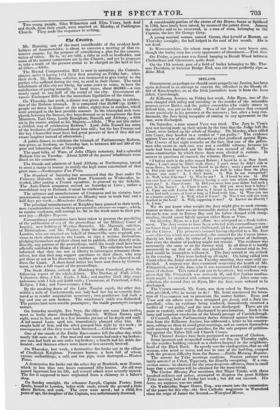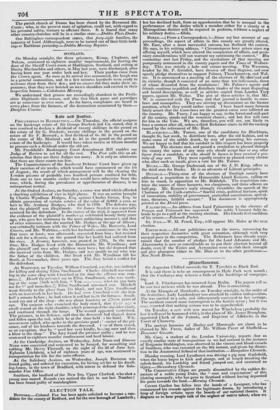IRELAND.
Government, or perhaps we should more properly say Justice, has been again defeated in an attempt•to convict the offenders in the bloody af- fair of Knocktopher, or, as the Irish journalists term it from the • locus delicti, Carrishough.
At Kilkenny. Assizes, on Friday last week, John Ryan, one'of the men charged with aiding and assisting in the murder of the miserable process-server Butler, and the police constables who vainly strove to defend him, was put on his trial. Two of the policemen that escaped swore positively to his presence at the massacre ; but, after a long con- finement, the Jury being incapable of coining to any agreement on the case, were discharged.
On Saturday, a man named Voss was tried. The Jury in Voss's
case not having made up their minds by the time that the Judge left the Court, were locked up the whole of Sunday. On Monday, When called into Court, they handed in a verdict of " not guilty." The evidence against Voss was of the same character as that produced against Ryan. The Courier of last night remarks on the fact, that one of the police- men who swore in each case was not a credible witness, because his uncle had been banished and his father was accused of theft. The cross-examination by which these facts were elicited is curious. In answer to questions of counsel, the witness, Harvey, said- " I had an uncle in the police named Robert ; I heard be is in New South Wales ; I can't swear he didn't walk there; I can't swear he didn't ride or swim there ; he might have been forced to go there ; many a good mad was. Q. Did your uncle ever hear a judge say, you shall be taken from the place whence you came? A. I don't know. Q. Was he not transported? A. Well, "what if he was ? Q. Was he not ? A. I heard he was. Q. Did you ever hear of a man named Harvey having a cave into which stolen sheep were put ? A. I hear it now. Q. Did you never hear your father had Such a cave in his house? A. I hear it now. Q. Did you never hear it before? A. Upon my oath I never did—that is, I heard it, but on my oath my father never had such a cave, at least as long as I lived with him. Q. Were you net in a lunatic asylum ? A. Well, what if I was? Q. Was it not said you were touched in the head? A. Well, supposing it was? Q. Answer me direttly? A. I was."
We do not know what weight the Jury might give to such cirenni- stances as these : there was no reasonable motive why Harvey, although his uncle was sent to Botany Bay and his father charged with sheep- stealing, should swear falsely against either Ryan or Voss. • On Monday, Ryan, as a last effort, was arraigned on a fresh indict-
ment. The Jury seems to have been selected with extraordinary care : no fewer than NI persons were challenged, :28 for the prisoner, and 108 for the Crown. The prisoner's counsel having objected to a Mr. Ince —an objection which was overruled—the counsel for the Crown imme- diately set him aside, by virtue of his peremptory power of challenge, that even the shadow of packing might not remain. The evidence was necessarily the same as on the former trial. In all three it is hardly necessarily to say that an alibi was pleaded. A criminal trial in Ire- land would be incomplete without it. The Jury retired at six o'clock in the evening. They were locked up all night. On being called into Court when the Judge arrived on Tuesday morning, they were still un- decided. A surgeon was then examined respecting the health of Mr. Fitzpatrick, one of the Jury, who it was rumoured had exhibited symp- toms of cholera. This turned out not to becorrect ; but evidence was given that Mr. Fitzpatrick was seriously ill, and that farther confine- meat might be attended with serious consequenc:es. After some con- sultation, the second Jury on Ryan, like the first, were ordered to be discharged.
The Crown counsel. Hr. Scott, was then asked by Baron Foster,
who presided, wlmt he meant to do ? Mr. Scott announced the inten- tion of eovernment not to prosecute the matter farther. Ryan and Voss and six others were then arraigned pro forma, and a jury in- panelled; who, no evidence being tendered, immediately returned a verdict of "not guilty," and the men were discharged. There are six more in custody, who will be discharged by proclamation. Such is the lame and impotent conclusion of the bloody passage of Carrickshough.
O'Connell, whom Parliamentary duties detained against his inclina- tion from the Kilkenny Assizes, has addressed a letter to his country- men, calling on them to avoid great meetings, and to content themselves with meeting in their several parishes, for the sole purpose of petition- ing against the Tithes Bill and Church Cesses.
The Clonnel Assizes have been postponed on account of Cholera. Some ignorant and misguided wretches set fire, on Thursday night, to the wooden building erected as a cholera hospital in the neighbour- hood of the Black Rock. So speedy was the conflagration, that an old woman, who acted as nurse, and was in care of the budding, escaped with the greatest difficulty from the flames.—Dublin Morning Register. The arrests for Tithe meetings continue. Sixteen persons were lately arrested at Caher, Tipperary, for illegally conspiring. If a con- viction cannot be obtained for the most desperate offences, there is small hope that a conviction will be obtained for the most trivial. The 'Carlow Morning Post mentions, that Major Tandy, with three hundred military and police, attempted to disperse the great Kildare Tithe meeting, held on Friday last week; but did not succeed. His force, we suppose, was too Satan. On Wednesday, Roger Hayes, Esq., was sworn into the commission of the peace for this city—the first Catholic magistrate in Waterford since the reign of James the Second.—Wateiford Mirror. The parish church of Doone has been closed by the Reverend Mr. Coote; who' in the present state of agitation, could not, with regard to his personal safety, venture to officiate there. It is feared that many other country churches will be in a similar state.—Dublin Plain Dealer.
Our Baitinglass correspondent states, that forty-eight families, the tenantry of Lord Aldborough, were to be turned out of their little hold- ings at Rathbran yesterday.—.Dublin Morning Register.



























 Previous page
Previous page